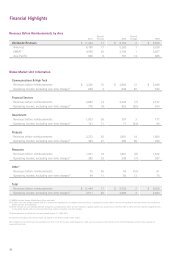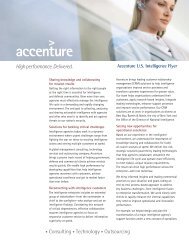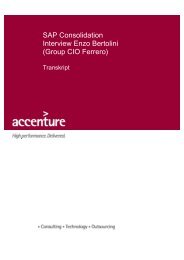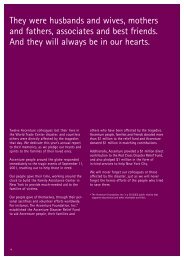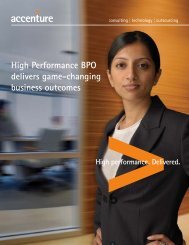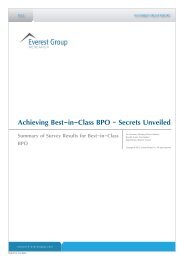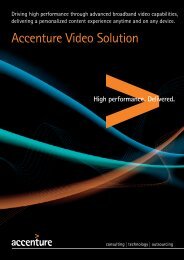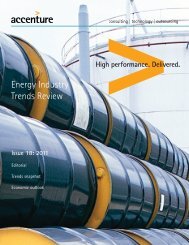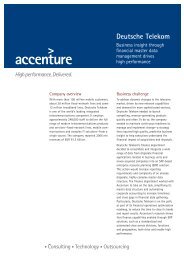Accenture Benchmarking Solutions From Insight to Action
Accenture Benchmarking Solutions From Insight to Action
Accenture Benchmarking Solutions From Insight to Action
Create successful ePaper yourself
Turn your PDF publications into a flip-book with our unique Google optimized e-Paper software.
Management Consulting<br />
<strong>Accenture</strong><br />
<strong>Benchmarking</strong> <strong>Solutions</strong><br />
<strong>From</strong> <strong>Insight</strong> <strong>to</strong> <strong>Action</strong>
Implemented by skilled<br />
professionals and supported<br />
by proven assets, <strong>Accenture</strong><br />
<strong>Benchmarking</strong> <strong>Solutions</strong><br />
helps companies quickly<br />
perform an objective<br />
assessment of the cost<br />
and performance of their<br />
finance function, identify<br />
and quantify improvement<br />
opportunities, and build the<br />
foundation for sustained<br />
high performance.<br />
The importance of<br />
benchmarking<br />
The finance function is a specialized<br />
and valuable resource that is critical<br />
<strong>to</strong> the success of any organization.<br />
<strong>Accenture</strong>’s ongoing research in<strong>to</strong> the<br />
characteristics of high-performance<br />
businesses has found that high<br />
performers exceed their peers in the<br />
ability <strong>to</strong> develop distinctive capabilities<br />
within their finance function <strong>to</strong> create<br />
a competitive advantage.<br />
<strong>Accenture</strong> research has also<br />
demonstrated that leading finance<br />
organizations do three things very well<br />
<strong>to</strong> achieve and maintain their leadership<br />
position. They:<br />
• Regularly identify the gaps between<br />
<strong>to</strong>day’s finance capabilities and those<br />
necessary <strong>to</strong> be competitive in<br />
the future.<br />
• Strive <strong>to</strong> be leaders in those<br />
capabilities that are most important<br />
given the needs of their business.<br />
• Pursue improvements via formal,<br />
structured change programs.<br />
In other words, leading finance<br />
organizations identify the areas of most<br />
need within the finance function—and<br />
areas where they can have the most<br />
impact on the business—and structure<br />
a change program <strong>to</strong> help ensure that<br />
the company gets the most out of<br />
scarce finance resources.<br />
In many organizations, however, the<br />
finance function struggles <strong>to</strong> meet<br />
those high standards with cost and<br />
performance varying widely. Finance<br />
cost as a percentage of revenue can<br />
easily be two or three times higher<br />
for one company compared <strong>to</strong> another.<br />
Similar disparities exist in terms of<br />
the performance of finance functions.<br />
Many companies are unaware of how<br />
their cost and performance compares<br />
<strong>to</strong> that of their peers, especially high<br />
performers. Without an accurate<br />
assessment of the current state of<br />
the finance function, change programs<br />
are <strong>to</strong>o often a hit-or-miss series of<br />
disparate initiatives that fail <strong>to</strong> deliver<br />
a sound return on investment.
Figure 1: <strong>Benchmarking</strong> answers critical questions and builds the foundation<br />
for improvement<br />
How much do I truly spend <strong>to</strong> deliver finance services?<br />
How is finance time spread across various finance processes?<br />
How effective is my finance organization at delivering value?<br />
How does my organization compare <strong>to</strong> others?<br />
What are the drivers/root causes of cost and performance?<br />
Where are the biggest opportunity areas?<br />
What is the value of closing the gaps?<br />
This need for a clear understanding of<br />
the current capabilities of the finance<br />
function is why benchmarking is a<br />
critical component of any finance<br />
transformation program.<br />
What is finance<br />
benchmarking?<br />
<strong>Benchmarking</strong> is the process whereby<br />
an organization captures specific data<br />
related <strong>to</strong> its costs and performance,<br />
and then compares this cost and<br />
performance data externally <strong>to</strong> a<br />
composite average of other companies.<br />
The benchmarking process can also be<br />
used internally: Organizations operating<br />
in several countries, or with multiple<br />
operating units and divisions, can<br />
compare cost and performance metrics<br />
across those different entities. A <strong>to</strong>p<br />
performer often emerges internally<br />
whose practices can then be adopted<br />
and leveraged across the enterprise.<br />
This combination of internal and<br />
external benchmarking helps <strong>to</strong> identify<br />
the most important gaps between an<br />
organization’s current state and where<br />
it wants <strong>to</strong> be, helping <strong>to</strong> create both<br />
a road map and a business case for<br />
change. (See Figure 1.) <strong>Benchmarking</strong><br />
can also generate the rigorous cost<br />
and performance baseline necessary<br />
<strong>to</strong> effectively track progress on that<br />
road map over time in terms of<br />
cost reductions and performance<br />
improvements. Ultimately, benchmarking<br />
helps organizations put in place a<br />
rigorous and continuous improvement<br />
process <strong>to</strong> bring out higher levels<br />
of performance across the organization.<br />
If one is <strong>to</strong> use benchmarking <strong>to</strong> drive<br />
high performance through the finance<br />
function, however, numbers alone are<br />
not enough. No database of information<br />
will churn out a ready-made<br />
prescription for a company’s unique<br />
set of circumstances. The quantitative<br />
dimension of benchmarking must be<br />
supplemented by a qualitative analysis<br />
informed by a deep understanding of<br />
finance function leading practices<br />
All cost components, processes and<br />
organization entities.<br />
Process based view of activities<br />
and costs <strong>to</strong> supplement the<br />
organization view.<br />
Quality, accuracy, cycle time, and<br />
positive impact on the business.<br />
Cost and performance – in <strong>to</strong>tal, by<br />
process, and by region.<br />
Organization model, process<br />
design, technology usage, and<br />
data structures.<br />
Specific processes, regions, business<br />
units, and/or cost components.<br />
Quantified cost reduction and<br />
performance improvement<br />
opportunities.<br />
and how they can be applied given<br />
the company’s industry, strategic<br />
goals and constraints.<br />
Providing that combination of<br />
quantitative and qualitative analysis<br />
through advanced benchmarking<br />
capabilities that can generate insights<br />
and drive high performance is the<br />
distinctive advantage of <strong>Accenture</strong><br />
<strong>Benchmarking</strong> <strong>Solutions</strong>.<br />
2
<strong>Accenture</strong> <strong>Benchmarking</strong><br />
<strong>Solutions</strong>: <strong>From</strong> insight<br />
<strong>to</strong> action<br />
Working in close collaboration with a<br />
client’s finance leadership, <strong>Accenture</strong>’s<br />
skilled professionals use the unique<br />
assets of <strong>Accenture</strong> <strong>Benchmarking</strong><br />
<strong>Solutions</strong> <strong>to</strong> deliver a comprehensive<br />
benchmarking assessment of the<br />
finance function. We then help a<br />
company translate insights from<br />
the benchmarking analysis in<strong>to</strong> an<br />
actionable set of initiatives, supported<br />
by a rigorous business case that can<br />
address shortcomings identified through<br />
the benchmarking process. With a<br />
sound set of comparative numbers and<br />
an analysis of the implications of those<br />
numbers, <strong>Accenture</strong> helps companies<br />
use the benchmarking process <strong>to</strong> drive<br />
high performance. The net result is<br />
efficient and effective use of scarce<br />
finance function resources.<br />
<strong>Accenture</strong>’s benchmarking process<br />
involves several phases that help<br />
companies discover, deliver and<br />
maintain the value from an analysis<br />
of their finance function performance.<br />
Collecting data<br />
Working with personnel from your<br />
finance function, we begin by<br />
gathering relevant data related <strong>to</strong><br />
costs, headcount, cycle time and<br />
performance. We are guided in this<br />
effort by the <strong>Accenture</strong> Finance Process<br />
Excellence Framework. The framework<br />
looks across all major processes of<br />
the finance function, allows drilldown<br />
in<strong>to</strong> the sub-processes and<br />
activities that make up each process,<br />
and provides a common structure <strong>to</strong><br />
help ensure consistent comparisons<br />
across companies and internally across<br />
different businesses or locations.<br />
(See Figure 2.)<br />
We supplement the data gathered in<br />
this phase with targeted executive<br />
interviews that enable us <strong>to</strong> put the<br />
numbers in<strong>to</strong> the proper context<br />
for analysis. This phase of the<br />
3<br />
benchmarking process establishes<br />
a formal baseline that helps make<br />
comparisons and also enables the<br />
measurement of progress when a<br />
transformation program is eventually<br />
put in place.<br />
This first phase of work typically<br />
generates insights—even before the<br />
formal benchmarking comparison—that<br />
are valuable <strong>to</strong> an executive team. For<br />
example, we worked with a company<br />
looking <strong>to</strong> reduce selling, general and<br />
administrative (SG&A) costs following<br />
a major acquisition. In the data<br />
collection phase of benchmarking,<br />
the company gained a greater<br />
understanding of the redundancies<br />
that existed in its various finance<br />
organizations around the world. That<br />
understanding was key <strong>to</strong> eventually<br />
delivering cost savings from its finance<br />
transformation program.<br />
Performing the<br />
benchmarking comparison<br />
In the next phase of work, we perform<br />
an external benchmarking comparison<br />
for the finance function in <strong>to</strong>tal as well<br />
as for individual finance processes. The<br />
assessment gives company executives<br />
a powerful snapshot look at how the<br />
finance function compares with peers,<br />
providing a quartile ranking of finance<br />
cost and performance metrics across all<br />
finance processes. This analysis allows<br />
us <strong>to</strong> identify processes not being<br />
performed at competitive levels of cost<br />
or service relative <strong>to</strong> peers.<br />
In addition <strong>to</strong> the quantitative analysis<br />
we perform a qualitative assessment.<br />
This evaluation looks at the extent<br />
<strong>to</strong> which externally validated leading<br />
practices have been adopted. It also<br />
helps identify root causes and drivers<br />
underlying the current performance of<br />
the finance function.<br />
<strong>Accenture</strong>’s approach during this<br />
phase of work is <strong>to</strong> identify leading<br />
practices not only within a specific<br />
industry but across all industries. This<br />
is important because companies can<br />
learn from others outside their industry<br />
as well as from within. For example,<br />
banks have completely transformed<br />
their “products” based on insights<br />
from consumer products companies.<br />
Retail companies compete in an<br />
extremely tight margin environment<br />
and therefore offer lessons for other<br />
industries where cost reduction is<br />
critical <strong>to</strong> success. And many energy<br />
companies have established truly global<br />
operating models that can be adopted<br />
by companies in other industries. If<br />
a company only compares itself <strong>to</strong><br />
like companies, they may miss out<br />
on opportunities <strong>to</strong> adopt innovative<br />
practices that can give them a<br />
competitive advantage in their industry.<br />
We also benchmark costs and leading<br />
practices internally by comparing<br />
geographies and business units <strong>to</strong> one<br />
another. This helps <strong>to</strong> identify internal<br />
cost and performance leaders so that<br />
their experiences and approaches can<br />
be identified for possible adoption by<br />
other parts of the organization.<br />
A benchmarking analysis permits<br />
executives <strong>to</strong> cast an objective light<br />
on their finance function, and on the<br />
presumptions by which it operates. For<br />
example, during a recent benchmarking<br />
study, executives found that what they<br />
had always referred <strong>to</strong> as “low-cost<br />
transaction processing” was, in fact,<br />
not low-cost at all. This finding enabled<br />
them <strong>to</strong> put in place more aggressive<br />
plans <strong>to</strong> bring costs in<strong>to</strong> line with<br />
companies identified as <strong>to</strong>p performers<br />
and bring focus <strong>to</strong> an area that was<br />
previously not on its management’s radar.
Figure 2: <strong>Accenture</strong>’s Finance Process Excellence Framework provides a consistent, processed<br />
based structure for benchmarking data collection and analysis<br />
1.0 Finance Function Management<br />
1.1 Manage Finance Organization<br />
1.2 Drive Enterprise Wide Change<br />
2.0 Finance and Accounting<br />
Operations<br />
2.1 General Accounting and<br />
Reporting (Record <strong>to</strong> Report)<br />
2.2 Fixed Asset Accounting<br />
2.3 Accounts Payable<br />
2.4 Travel & Expense<br />
Reimbursements (T&E)<br />
2.5 Order <strong>to</strong> Cash<br />
2.6 Product Costing and<br />
Inven<strong>to</strong>ry Accounting<br />
2.7 Finance Systems and Data Structures<br />
Identifying and quantifying<br />
improvement opportunities<br />
Based on a summary of cost and<br />
performance data and on the related<br />
qualitative assessment and root-cause<br />
analysis, we help finance executives<br />
identify specific improvement<br />
initiatives <strong>to</strong> close the gap between<br />
their performance and that of external<br />
leaders. This summary of initiatives<br />
mapped against projected benefits<br />
enables companies <strong>to</strong> create change<br />
programs that can return the most<br />
benefits for the least cost. With a road<br />
map in place, supported by an objective<br />
business case, companies are better<br />
equipped <strong>to</strong> take the specific steps<br />
necessary <strong>to</strong> transform their finance<br />
organization.<br />
Tracking improvements<br />
over time<br />
High performance means achieving<br />
sustainable business results. Full<br />
value will not be generated from<br />
3.0 Enterprise Performance<br />
Management<br />
3.1 Strategic Planning/<br />
Shareholder Value Targeting<br />
3.2 Target Setting<br />
3.3 Planning, Resource<br />
Allocation and Forecasting<br />
3.4 Performance Reporting<br />
and Analytics<br />
4.0 Corporate Finance<br />
4.1 Internal Controls<br />
4.2 Inves<strong>to</strong>r Relations<br />
4.3 Treasury and Cash<br />
Management<br />
4.4 Corporate Tax<br />
a finance transformation program<br />
unless structures and processes are<br />
put in place <strong>to</strong> help a company track<br />
improvements. <strong>Accenture</strong> <strong>Benchmarking</strong><br />
<strong>Solutions</strong> helps companies put in place<br />
the metrics and assessment capabilities<br />
that enable them <strong>to</strong> measure progress<br />
against their baseline over time.<br />
A leading practice adopted by many<br />
of the <strong>to</strong>p performers is <strong>to</strong> conduct<br />
additional periodic benchmarks,<br />
creating a platform and a culture for<br />
continuous improvement. This regular,<br />
periodic benchmarking is important<br />
given the pace of change in <strong>to</strong>day’s<br />
business markets. It identifies new<br />
opportunities as they arise and helps<br />
an organization redirect its finance<br />
function <strong>to</strong> take advantage of<br />
those opportunities.<br />
5.0 Enterprise Risk<br />
Management<br />
5.1 Financial Risk<br />
Management<br />
5.2 Non-Financial<br />
Risk Management<br />
4
<strong>Accenture</strong> has a long<br />
track record of working<br />
collaboratively with finance<br />
executives <strong>to</strong> drive successful<br />
change in their organizations<br />
that can generate greater<br />
shareholder value. Our<br />
benchmarking process is<br />
rigorous, fast, pragmatic,<br />
and actionable—leading an<br />
organization rapidly from<br />
insight <strong>to</strong> action.<br />
5<br />
Why <strong>Accenture</strong>?<br />
With proven assets, deep skills in the<br />
finance area and broad experience<br />
applying <strong>Accenture</strong> <strong>Benchmarking</strong><br />
<strong>Solutions</strong>, <strong>Accenture</strong> is ideally<br />
positioned <strong>to</strong> help your organization<br />
drive high performance through<br />
finance benchmarking. Our distinctive<br />
advantage can be found in:<br />
Our approach<br />
Our benchmarking process is rigorous,<br />
fast, pragmatic and actionable—leading<br />
an organization rapidly from insight<br />
<strong>to</strong> action.<br />
Our depth and breadth<br />
of experience<br />
<strong>Accenture</strong> has a long track record of<br />
working collaboratively with finance<br />
executives <strong>to</strong> drive successful change<br />
in their organizations that can generate<br />
greater shareholder value. We have<br />
a dedicated Finance & Performance<br />
Management service line focused on<br />
all aspects of the CFO agenda. We<br />
also have the industry-specific insights,<br />
global market access and skilled<br />
practitioners <strong>to</strong> help companies<br />
across all industries and geographies<br />
develop a deeper understanding of<br />
their finance capabilities and drive<br />
transformational change.<br />
Our research and<br />
thought leadership<br />
Our Finance & Performance<br />
Management service line is<br />
acknowledged as an industry thought<br />
leader. Our ongoing research program<br />
in<strong>to</strong> high-performance finance—based<br />
on primary research, CFO surveys and<br />
our own client experiences—explores the<br />
relationship between finance mastery<br />
and achieving high performance.
Our <strong>to</strong>ols and assets<br />
<strong>Accenture</strong> <strong>Benchmarking</strong> <strong>Solutions</strong> uses<br />
a proven project methodology with a<br />
rigorous process for data collection,<br />
consolidation and validation, as well as<br />
results analysis and interpretation. Our<br />
quantitative and qualitative assessment<br />
<strong>to</strong>ols include:<br />
• Metrics: A formal list of important<br />
metrics for cost, headcount, quality,<br />
cycle time and volume across all<br />
finance processes.<br />
• Database: A benchmarking<br />
database comprised of companies<br />
of all sizes across multiple industries<br />
and geographies.<br />
• Tools: Standardized data collection<br />
<strong>to</strong>ols for capture and consolidation<br />
of data.<br />
• Mastery scales: Summaries for each<br />
major process that define “basic,”<br />
“competitive,” and “mastery” levels<br />
of performance.<br />
• Leading practices: An extensive<br />
list of leading practices across all<br />
finance processes.<br />
• Interview guides for qualitative<br />
analysis: Efficient and comprehensive<br />
discussions with client executives that<br />
support effective root-cause analysis.<br />
Our people<br />
Making it all happen is our team of<br />
experienced practitioners. <strong>Accenture</strong>’s<br />
Finance & Performance Management<br />
service line maintains a dedicated core<br />
of thousands of deeply experienced<br />
professionals in finance and accounting<br />
capabilities. A typical benchmarking<br />
engagement would include an on-site<br />
team that works collaboratively with<br />
your leadership <strong>to</strong> execute the project<br />
as well as subject matter advisors in<br />
finance function benchmarking who<br />
serve as advisors throughout the<br />
benchmarking process, from planning<br />
<strong>to</strong> data collection <strong>to</strong> results analysis.<br />
6
About <strong>Accenture</strong><br />
<strong>Accenture</strong> is a global management<br />
consulting, technology services and<br />
outsourcing company. Combining<br />
unparalleled experience, comprehensive<br />
capabilities across all industries and<br />
business functions, and extensive<br />
research on the world’s most successful<br />
companies, <strong>Accenture</strong> collaborates<br />
with clients <strong>to</strong> help them become<br />
high-performance businesses and<br />
governments. With more than<br />
178,000 people in 49 countries, the<br />
company generated net revenues of<br />
US$19.70 billion for the fiscal year<br />
ended August 31, 2007. Its home<br />
page is www.accenture.com.<br />
Copyright © 2008 <strong>Accenture</strong><br />
All rights reserved.<br />
<strong>Accenture</strong>, its logo, and<br />
High Performance Delivered<br />
are trademarks of <strong>Accenture</strong>.<br />
About Finance &<br />
Performance Management<br />
The <strong>Accenture</strong> Finance & Performance<br />
Management service line helps clients<br />
on their journey <strong>to</strong> high performance<br />
by identifying critical issues relative <strong>to</strong><br />
the office of the CFO, setting strategic<br />
direction and successfully delivering<br />
innovative solutions <strong>to</strong> transform their<br />
finance management capabilities. We<br />
offer a range of financial consulting<br />
services, focusing on the areas<br />
of corporate finance, enterprise<br />
performance management, finance<br />
operations and risk management.<br />
Contact<br />
For more information about how<br />
<strong>Accenture</strong> <strong>Benchmarking</strong> <strong>Solutions</strong><br />
can help your finance organization<br />
move from insight <strong>to</strong> action <strong>to</strong> high<br />
performance, please contact us at:<br />
fpm.service.line@accenture.com<br />
We have the breadth of experience,<br />
global resources, superior assets and<br />
deep knowledge and insights <strong>to</strong> help<br />
the CFO create new forms of value<br />
that can drive high performance.<br />
Our extensive research, insight and<br />
innovation, global reach and delivery<br />
experience have made us a worldwide<br />
leader, serving thousands of clients every<br />
year, including many of the FORTUNE®<br />
500 companies across virtually all<br />
industries. For more information, visit<br />
www.accenture.com/fm or contact us<br />
at fpm.service.line@accenture.com.<br />
North America<br />
David Davidson<br />
david.a.davidson@accenture.com<br />
Senior Executive, Finance &<br />
Performance Management<br />
Charles Wise<br />
charles.p.wise@accenture.com<br />
Senior Manager, Finance &<br />
Performance Management<br />
Europe, Africa and<br />
Latin America<br />
Dr. Christian Campagna<br />
christian.campagna@accenture.com<br />
Senior Executive, Finance &<br />
Performance Management<br />
Björn Lagerbring<br />
bjorn.lagerbring@accenture.com<br />
Senior Executive, Finance &<br />
Performance Management<br />
Asia Pacific<br />
Naohide Nomura<br />
naohide.nomura@accenture.com<br />
Senior Executive, Finance &<br />
Performance Management



